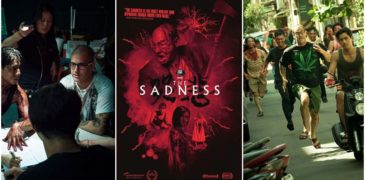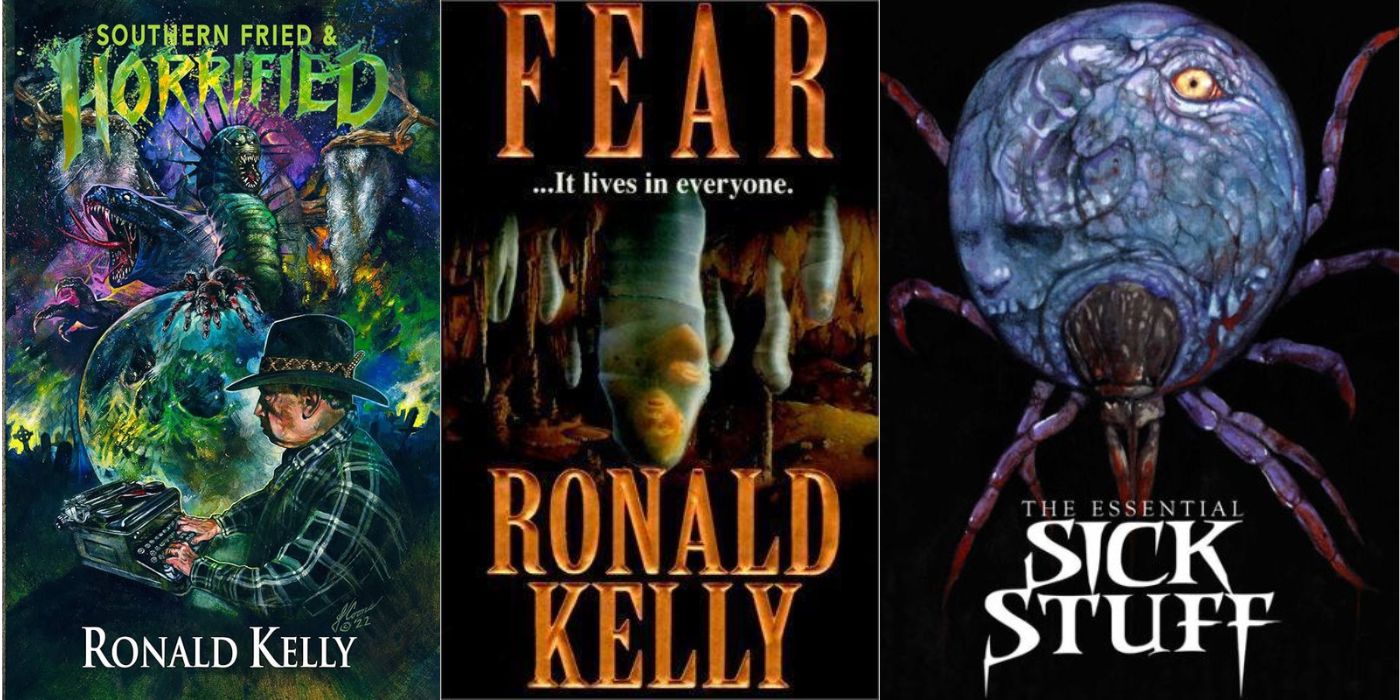
Ronald Kelly hails from small town Tennessee, where he was born on November 20th, 1959. Having grown up on a steady diet of EC Comics and the old Universal Monster movies, Ronald initially had aspirations of being a comic book artist (alongside his classmate Lowell Cunningham, the creator of Men in Black). That was until a creative writing class in his junior year led Ron toward his true calling: being an author.
While working a number of blue-collar jobs straight out of high school, Ronald tried his hand at several genres of fiction: from men’s adventure and true crime to epic westerns in the vein of Larry McMurtry. But it wasn’t until he started penning southern-styled horror stories that he gained traction in small press magazines. 1990 saw the publication of Ron’s debut novel, Hindsight, released by Zebra Paperbacks. This led to the release of eight novels over the course of six years, including titles such as Pitfall, Blood Kin, and Fear. While these early novels earned Ronald a devoted readership, the horror publishing implosion led Zebra to drop their horror line in 1996. Unable to get into any other market, Ronald quit writing for ten years.
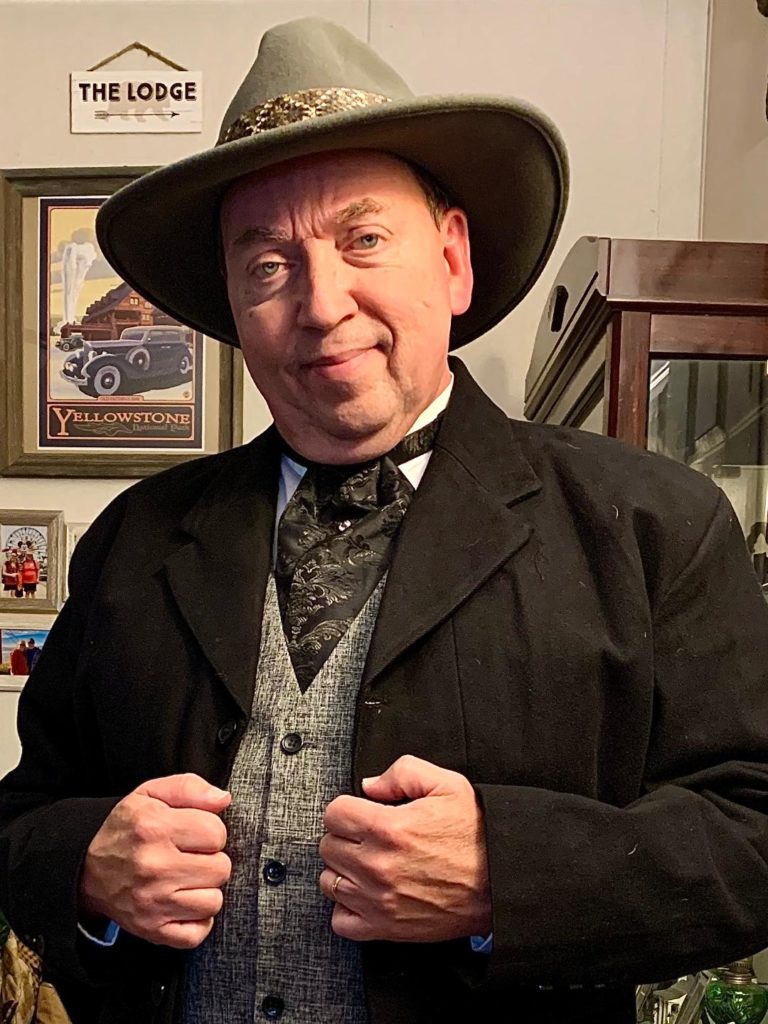
In 2006, at the encouragement of a legion of fans who clamored for his return inside the backrooms of online message boards, he made his comeback. Cemetery Dance Publications released a limited hardcover of his collection Midnight Grinding & Other Twilight Terrors in 2008, as well as a hardcover of his first novel in more than ten years, Hell Hollow (originally slated for Zebra before they dropped their horror line). Since then Ronald Kelly has put out several themed story collections, as well as rereleased nearly all of his Zebra titles in paperback.
Ronald’s story collection, The Essential Sick Stuff, won the 2021 Splatterpunk Award, and his memoir Southern-Fried & Horrified has been heralded as a must-read by readers and fellow writers alike. Even today as I write this (mid-November 2023), people eagerly anticipate the release of the sequel to Ron’s classic coming-of-age novel Fear. It is my supreme pleasure to sit back and talk with Ron.
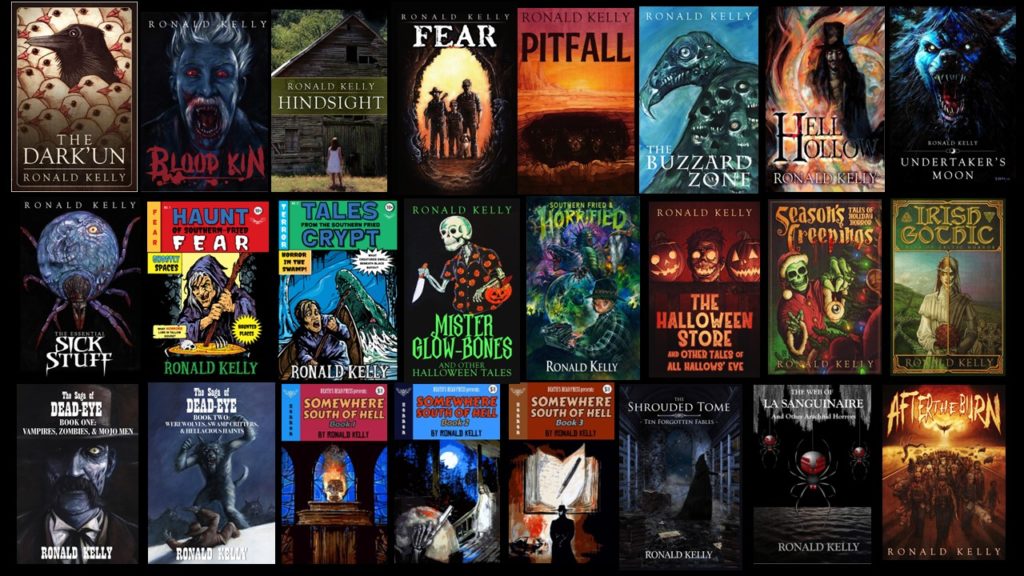
Thanks for agreeing to speak with me, Ron.
RK: It’s my pleasure, James. I always enjoy our conversations about the writing business, horror genre history, good books, and old horror flicks. This interview will sort of be like inviting like-minded, horror-loving folks to join us around the campfire, to sit a spell and bask in the darkness we all seem to have an inherent hankering for.
You’ve been writing professionally since the mid-eighties, with a brief pause thrown in when Zebra stopped publishing horror. That’s a heck of a long career, and you show no signs of stopping anytime soon. To what do you attribute your prolific output over the years?
RK: Well, even from a young age, when all I wanted to do was draw and paint, I had a strong drive to create. Coming from family backgrounds that centered on tobacco farming and blue collar work, that sort of made me the odd kid of the bunch, like a hammer in a silverware drawer. When I set my sights a bit higher in high school and dreamt of being a comic book artist, I knew I wanted my work to be seen and appreciated by those beyond just me or my family. Then I ditched the comic book ambitions in my junior year and started writing short stories, and it was clear exactly what I wanted to devote that creative drive to. I wanted to be a writer.
As for why I’ve always been prolific in my writing, it was mostly spurred by the folks around me who thought my chances of making it at writing were slim at best. There were family who thought I was wasting my time “piddling with tall tales”, rather than focusing on learning a hands-on trade… my father being one of them. That, most of all, lit a fire under me that’s pretty much never gone out. It might have smoldered for a while, particularly during my decade hiatus between 1996 and 2006, but deep down, it was still there. Plus, my grandmother instilled a great love of storytelling in me through the passing on of vocal family history and ghost stories. It’s a gift she gave me that I’ll always cherish and strive to use to the best of my ability.
You’re a master of the short story and novella form, having released a number of story collections as well as bonus novellas to the reprints of your classic Zebra novels. You’ve also mentioned in past interviews and podcasts that you prefer the short story over the novel. What was it about the short story that enticed you so, creatively speaking?
RK: Most writers have their own personal favorite as far as which narrative form suits their storytelling muse the best. Most in the horror genre these days specialize in novellas, which was quite a surprise when I returned to writing in 2006, because in the 1980s and 90s, the novella wasn’t all that popular, except in collections. Back then, writers normally started out honing their craft and finding their voice through short stories, hoping to eventually break into mass market paperbacks. I did the same, but I always found short fiction to be more satisfying and creatively fulfilling than drawing out a plot and cast of characters in lengthy novel form, although I’ve been successful in pulling that off too, especially those big ol’ door-stoppers I penned for Zebra. The short story, though, is more of a challenge and, if you’re adept at it, gives you a greater chance of publishing success in a shorter period of time. I can write twenty or more short stories in the same amount of time as I can do one 400 page novel, so, if I have the choice, that’s what I shoot for first. I reckon that’s why I have so many story collections in print, compared to the number of novels I’ve had published over the years.
A more recent highlight in your career since your return to writing has been your memoir, Southern-Fried & Horrified. This book has been really successful, with a lot of readers and fellow writers singing its praises. Am I correct in remembering that the initial genesis of the book came from essays and mini-stories you posted on Twitter?
RK: Yes, as well as other online hangouts like Facebook and a blog I had for several years, also called Southern-Fried & Horrified. I know it might seem to be the product of an overblown ego or obscenely pretentious, writing a memoir, unless you’re a writer in the upper ranks of publishing notoriety. But I’ve been in the horror business for 38 years now – it would have been 48 if it hadn’t been for those ten years of inactivity – and it seemed that folks had a hankering to know about my journey as a writer, as well as how the horror genre worked during my first leg as published author, so I thought “why not write it all down, honestly, warts and all, and try to make it entertaining in the process?” So, I pitched the idea, found a publisher willing to take a chance with it, added some writing advice and top-ten lists of my favorite books and movies, and that’s how Southern-Fried & Horrified came to be. And, truthfully, I was doubly blessed to have that incredible artwork by Justin T. Coons for the cover. If you ever want to peel back Ol’ Ron’s skin and step inside for a while… this book should do the trick for you.
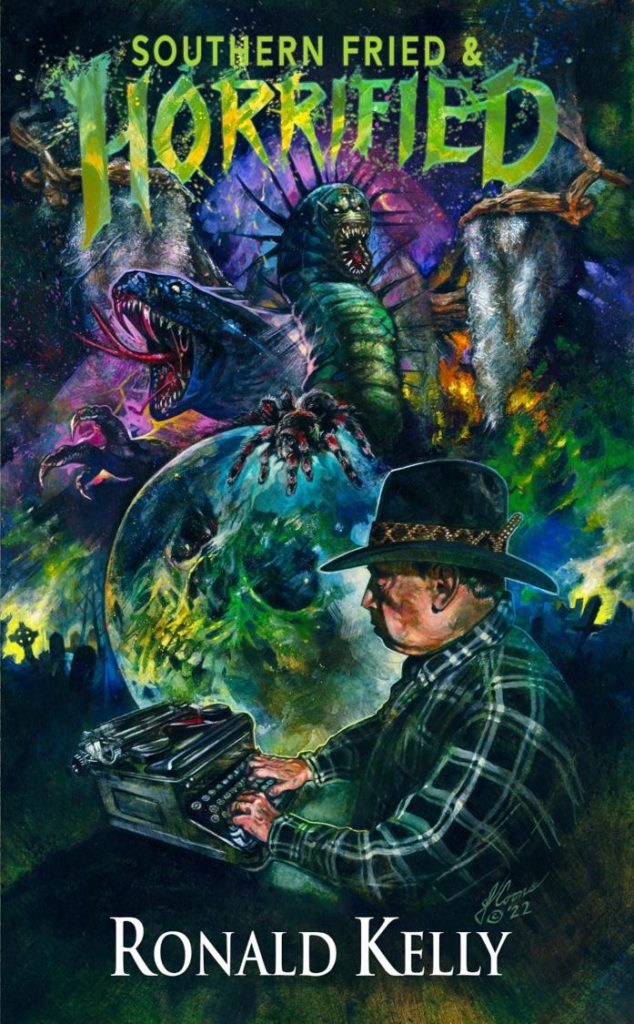
One of the things I appreciate most about you, especially since reading your memoir, is the fact that you didn’t rely on a college education to learn your craft. You made your way through trial and error, and honed your skills through constant writing; this goes against the advice that a high school English teacher had given you. Do you ever look back over your career and think about how far your writing has come?
RK: Given that I came from a rural upbringing that prizes manual labor and competitive sports—football in particular—over anything remotely intellectual or creative in nature, I feel fortunate to have made it as far in the writing business as I have. I came from a lower middle-class family with modest means, and college graduates in our clan were about as plentiful as whiskers on a bull frog. So, when I told that teacher that I wouldn’t be attending college after graduation, the disappointment and pity that shone in her face sort of… Well, to tell the truth, it sort of pissed me off. So I worked my ass off to prove her wrong, along with a few others in my family who believed I was “weak and irresponsible” for not wanting to devote my life’s work to the tobacco fields or the factories. I read voraciously and studied how my favorite authors wrote and constructed their narratives and characters… Writers like Stephen King, Manly Wade Wellman, Joe R. Lansdale, and Robert R. McCammon. But I never really wanted to emulate them. My objective was always to find my own voice and own way of storytelling and convey them in a way that entertained readers and emotionally immersed them in the story I was telling, from the first page to the last. It was a long journey, with a lot of bumps and potholes—sometimes sinkholes—along the way, but, after all these years, I believe I have the art of storytelling as close to the way I want as I can get.
Would you have any advice you could give to writers who might be worried that they don’t have a college degree backing them up? There are of course many paths to becoming an author, but many places try to push one particular path.
RK: My advice to aspiring writers is to take that deep-down desire for storytelling and sharing it with others, and shape it and mold it into the form that pleases you first. Your audience is secondary. That might sound a little arrogant and selfish, but a writer has got to be a pure and faithful fan of his own work before he has any chance of selling it to others, especially those who are willing to shell out their hard-earned pay for it. Also, as I said before, you don’t have to have a literary degree to be a writer. If you have that desire, whether you’re a college professor or a waitress down at the Cracker Barrel, sit down and write and never let anyone tell you that you don’t have the right or know-how to make it in your chosen genre. Would it have taken me twelve years to make it to publication if I’d gone to college and earned a sheepskin? Probably not. I’d probably made it in half the time. But then, I wouldn’t have had that dozen years of life experience and work-based inspiration to draw off of… inspiration that I still draw off of to this day.
You’ve shared some great moments in your memoir, as well as some not-so-great moments. Was it especially challenging to confront those periods in your life, given that you couldn’t use the veil of fiction to give you some distance from the material?
RK: In a lot of ways, writing Southern-Fried & Horrified was a catharsis that my soul had yearned for a very long time. There were times, not only in my writing journey, but my life in general, that were unpleasant… times and things that I’d put behind me or just didn’t want to dwell on or deal with. Sure, writing the memoir opened some old wounds—one being the loss my writing career in 1996 and giving it and my love of horror up for a decade—but, deep down inside, I knew writing it all down and finally staring it square in the face was a balm I’d needed for years. It exorcized some demons that had been festering in the back of my mind, and weighing down my spirit, for years. Looking back, I have no regrets with anything I wrote about or brought to light in the memoir. Sometimes it does a writer good to look back at all the hills and valleys that brought him to the point where he is now.
Many of your fellow writers have noted their appreciation for you discussing the loss of publishers who’ve published your books. Between Zebra, Sinister Grin, and even Silver Shamrock, you’ve felt the weight of seven publishers closing their doors. Would you say that this sort of thing has become easier to foresee and deal with in today’s climate than back in the 1990s? Did other writers reach out to you when recent publishers went under?
RK: Although I once had this glorious vision that all publishers, great and small, were invincible and immortal when I first started out in the writing game. Unfortunately, that’s far from being the case. Numerous circumstances can cause a publisher to shut down at a moment’s notice, be it a big publishing line like Zebra Horror closing their doors because of flagging sales or an independent press that can no longer sustain the rigor and expense of publishing on a regular basis. Even today’s ‘cancel culture’ mentality can bring down a healthy and respected publisher in a day’s time for a single problematic misstep or moment of indiscretion. Many in the community of writing—not only in horror—are very unforgiving and quick to judge, before all the facts are verified and proven. It’s unfortunate when that happens, but it does happen occasionally. True, sometimes you can see it coming—sometimes months or years ahead of time—but sometimes the social media torches are lit, white hot, and the castles are stormed. Then, well-meaning folks, both publishers and their authors, suffer because of it.
On an episode of the Dead Headspace Podcast, the hosts shared with you a montage video of various authors who told you how much you and your work have meant to them. This was on the episode signaling the release of your memoir. Was it surprising to see how much of an impact you’ve had on the horror community? I remember you talking about possibly quitting a second time in 2019, but the outpouring of love and support from fans and fellow writers seemed to bring you back.
RK: Good Lord, yes! That video montage on that episode of Dead Headspace practically had me in tears at the end. I wasn’t expecting that at all. It was incredibly humbling to find out that my work had inspired and meant so much to so many of my fellow writers throughout the years. Folks like Brian Keene, Jonathan Janz, James Newman… too many to even mention really, who have inspired me as well. It’s very easy in this business to be too hard on yourself. To tell yourself that you’ve tried your best and aren’t good enough… That maybe you should just finish this gig and fade away quietly. Then a loyal reader or a fellow writer comes along and just blows the hell out of that foolish notion with words of kindness and gratitude. That’s when you get a pat on the shoulder and kick in the rear and you find out that a lot of folks out there appreciate what you’ve brought to the table much more than you realize.
Switching gears a bit, I wanted to ask you about those of your books which seemed to be quite the change-up from your more traditional creature horror books. Of course, I’m talking about The Essential Sick Stuff, as well as After the Burn, but even The Buzzard Zone feels very different from work such as Fear or Hindsight. Yet they still carry your distinct voice, even with the more overt gore and violence. How do you prepare to write such…controversial material as opposed to your tamer, more “southern-fried” stuff?
RK: All the books you mentioned happened when I felt a need to spread my wings a bit and step outside the comfort zone of my traditional Southern-Fried horror tales. With The Essential Sick Stuff, it was stories from different periods in my career when I experimented with splatterpunk in the early 1990s or extreme horror around 2009 and 2010, as well as recent attempts at pulling out all the stops and allowing the story be as raw and gory as it needed to be. After the Burn came at a time when I felt like I was spinning my wheels; when I felt that I needed to up my game drastically or be swallowed up in a tide of mediocre fiction. There were things in After the Burn that went way beyond my comfort zone… but I still think it’s one of the finest collections of short stories and novellas that I’ve ever written. The Buzzard Zone has the same edge and unapologetic narrative as the other two, but since it’s also an apocalyptic story like After the Burn, I knew it was one that couldn’t be allowed to be told discreetly. Some stories deserve to be Nerf darts, while others should have the impact of hollow point bullets or shotgun shells. When flesh-eating zombies and the dark side of society is in control, folks are going to end up suffering and dying horribly, even if they are some of the reader’s most beloved characters.
Do you ever feel any sense of discomfort when writing gruesome horror? What scares you, and what moves you to create when you’re afraid?
RK: Sometimes stepping beyond the humdrum routine of everyday life and writing about the abnormal or gruesome can be disturbing, but I don’t believe a horror writer is truly effective if they shy away from the darkness of life and death, or those in society that embrace that darkness in sick and indulgent ways. That’s pretty much 99% of what horror authors write about isn’t it? Those who believe they are beyond the bounds of morality and wisdom… Be they serial killers or supernatural beings. As for what scares me, it seems like the list grows longer the older I get. When I was a young man, I felt invincible and certain things didn’t scare me as much as they do now at age 64. Things like cancer and dementia scare me the most, because both things have plagued members of my family—all gone now—during the latter years of their lives. When I was a single man, I didn’t fear for the well being of my family as much as I do now with a wife and three children. If anything should happen to any of them, I’m not sure I would ever recover from the loss. As for fear and the creative process, terror and anxiety is the fodder that feeds the psyche of the horror writer. Without taking our own worries and dreads, and using them as the flesh and bones of the novels and stories we write, we would be ineffective. We might as well write science fiction, westerns, or romance. It’s our deepest and darkest fears and angst that set us apart from the writers of other genres… that give our work its fangs and claws… that stalks our readers beyond the very last page.
The Essential Sick Stuff won the Splatterpunk Award in 2021. How did it feel to win that award?
RK: It felt wonderful and personally vindicating, since it was the first literary award I’ve ever won. So far, the coveted Stoker has eluded me. It would be nice to have one of those little haunted houses on my bookshelf, but if it never happens, I’m okay with that. Awards and accolades are nice, but they are fleeting and easily forgotten in a few years’ time. That’s something a lot of today’s writers fail to see or want to acknowledge. I’d rather get a personal message from a new reader that just finished Fear or Undertaker’s Moon and loved it, than fight and campaign for an award along with hundreds of others in the genre, deserving of the honor or not.
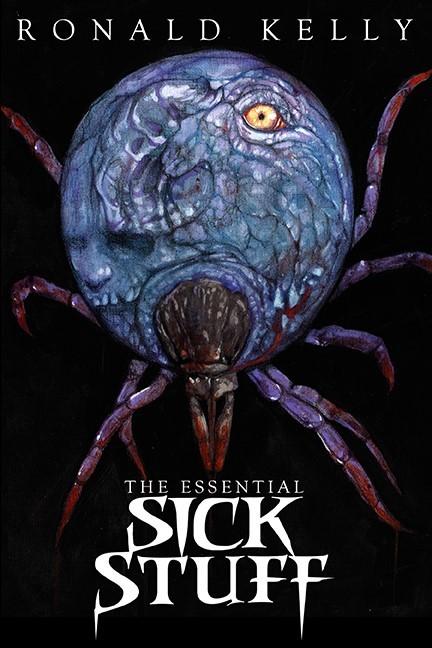
You had a brief claim to fame with the Grammies as well, right?
RK: (Laughs) Yes, but I consider that a fluke. My audio collection, Dark Dixie: Tales of Southern Horror, got a particularly nice review in Publisher’s Weekly when it was released in 1992. The next thing I knew, my agent calls me up and says, “Do you know that Dark Dixie is on the nominating ballot for a Grammy Award?” At first, I thought he was pulling my leg. A few days later, he mails me a copy of the ballot and, sure enough, it was on there for Best Non-Musical and Vocal Recording. Of course, it wasn’t the final ballot – there were dozens of other audiobooks to compete with – but it was considered nonetheless. So, looking back, that was a nice little nod to my style of storytelling and a fond memory I’ll carry around for the rest of my days.
What do you think of the modern horror community as opposed to the way it was when you first started out? In what ways has the modern technological age affected your writing and interaction with fans and publishers?
RK: I can see the appeal of how the horror genre was back when I started out in the 80s and 90s, as well as how it stands now. Back then, the publishing business seemed much smaller and simpler. There weren’t as many horror writers—a couple of hundred or so, compared to literally thousands now. There were a limited number of horror books being printed and released throughout a year’s time, and readers anxiously looked forward to those releases. Nowadays, with so many independent presses and self-published writers in the field, flooding social media, fighting for traction, it has become a bit overwhelming and stressful. I’ve seen some weeks where twenty or thirty books have been released by various authors. I’m not saying that’s particularly a bad thing… But it does create a lot of white noise with so many books being released simultaneously or one after the other. I do like how the genre has changed as far as diversity and the inclusion of all ethnic groups and orientations. It’s something that we’ve needed in horror—and all genres—for a very long time. I’ve never seen such a varied palette of horror fiction being penned and published in all the years I’ve been writing. It’s refreshing and vital for the genre to survive and grow.
As for the progress of technology in the writing community, it has its positives and negatives. When I wrote for Zebra, I felt like a monk writing in some lonesome abbey, with no contact with fellow writers or readers. There was no internet to speak of in those days and you either had to talk to someone on the phone or carry on a conversation with snail mail. Today, email and private messaging through various social media platforms give you easy access to both writers and readers, and in turn they can quickly become good friends. So, in that aspect, I love that I can communicate in that manner. But, on the down side, social media and easy access to writers and fans can bring out the worst in some people. Time and time again, we see some lowlife emerge out of nowhere and cyber-stalk others, sending inappropriate DMs and preying on folks’ good intentions and desire for friendship. Unfortunately, that’s happened quite a bit in the horror community over the past few years. Just when you think things have improved, another slimeball shows up, becomes everyone’s supporter and best friend, then lets everyone down when they reveal themselves to be a complete asshole, or worse.
What has been one, or even two or three moments, where a fan or fellow writer has interacted with you, and it made you feel like you’ve made the right choice in becoming a horror writer?
RK: There have been several times when I’ve come to the realization that something that I wrote actually touched someone in a profound way. Two folks that come immediately to mind are Nick Dennis and Mary Danner. According to them, both read my novel Fear at key times in their lives and it had a positive impact on them. They’ve both talked about this publicly, so I’m sure it’s okay to share it with you. With Nick, it helped him through a very dark time in his life and with Mary it inspired her to pursue editing as a career. You always hope to entertain people with your work, but if it goes a step further and touches them on an emotional or spiritual level, that makes the effort much more worthwhile.
As far as fellow writers are concerned, I’ll never forget attending my first Scares That Care event. Brian Keene stopped by my table before the crowds came in and sat with me and my family for a while. He turned to my son and daughter and said “You know, your dad being here is sort of a big deal. A lot of us wouldn’t even be writing this stuff if it wasn’t for him.” Up until that point, it’d never dawned on me that something I’d written twenty or thirty years earlier might have inspired someone to think “Hey, maybe I could do this if I gave it a chance.” There’s no greater compliment for a writer than to know their work may have influenced the generation of storytellers who came after them, or even beyond that.
Who are some of your favorite writers today? What about today’s horror films and art/comics?
RK: My list of favorite writers in the genre is a long one. Practically everyone I’ve read in the last twenty years has something unique to offer. I reckon my favorites include folks like Stephen King, Brian Keene, Joe Lansdale, Cina Pelayo, Brennan LaFaro, Jonathan Janz, Candace Nola, Ronald Malfi, Ruthann Jagge, James Newman, the Sisters of Slaughter, Michelle Garza and Melissa Lason. As far as extreme horror goes, I’m into Kristopher Triana, Daniel Volpe, Aron Beauregard, and Judith Sonnet. But, like I said, most everyone out there has something distinctively special in their way of telling a story.
As for movies, I grew up on the Universal Monsters and the old 1950s and 60s creature feature films, but I’m also a huge fan of M. Night Shyamalan and Mike Flanagan and their work. Knock at the Cabin and Doctor Sleep are two of my favorite horror films… although I personally thought Paul Tremblay’s The Cabin at the End of the World was more impactful than its adaptation was.
Everybody’s favorite novel of yours is Fear, and you are currently writing a sequel to that book. With the exception of the Dead-Eye series, this is the first time you’ve done a sequel novel. What prompted this current project?
RK: Actually, I have done a sequel before, other than The Saga of Dead-Eye. My horror/suspense novel Restless Shadows, which Zebra Books originally had on their schedule before they shut their horror line down, is the sequel to my first novel, Hindsight. We’ll be rereleasing that in paperback in early 2024.
As for the sequel to Fear, I never actually thought I’d be writing one, but when Fear began to draw renewed interest and popularity again, I began toying with the idea of continuing the story of Fear County in some way. For a while, I didn’t pursue it, because I couldn’t think of a way in which to offer an all new premise to readers, while also incorporating much of what made the original book appealing, in the way of recurring characters. After all, Fear Eternal will be set in present day Tennessee, so story-wise, there has been nearly eighty years’ time between the events of the two novels. It took some brainstorming on my part, but I think I’ve finally come up with the perfect way to meld the dynamics of Fear and its sequel. And, like the first one, Fear Eternal will be a real tear-jerker… maybe even more so than the original.
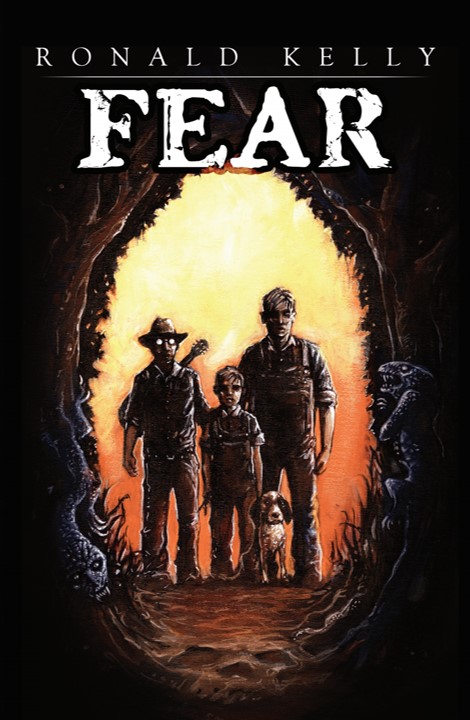
Am I correct in saying you will be doing more cosmic horror in your future work?
RK: Yes, it seems like I’ve been adding more and more cosmic horror into my work in the past couple of years. Fear Eternal will have its fair share, which may provide some answers as to why Fear County is the most evil county on earth and where some of its horrors and creatures originate from. Also, I’ve been very liberal in featuring cosmic horror in The Saga of Dead-Eye western horror series. The series main antagonist, the dark witch Evangeline possesses the famed Necronomicon and uses it to conjure otherworldly beings and creatures from a portal known as the Hole Out of Nowhere. It’s been fun to do my own take on what H.P. Lovecraft originally brought to the horror genre. Cosmic horror sort of gives a writer the freedom to draw from unknown realms and worlds, which makes practically anything possible during the course of the story.
Will you be at the Scares That Care Authorcon in 2024, right? What can we expect from Ronald Kelly at this upcoming event?
RK: Yes, I’ll be at the Williamsburg event as a vendor with the lovely Mrs. Joyce and the Southern-Fried Horror table. I should have several new books on the table by then, including Restless Shadows, The Saga of Dead-Eye Book Three, and the paperback release of my Southern gothic ghost novel, Burnt Magnolia. And, of course, I’ll have all my other novels and story collections, as well as Southern-Fried Horror and Zebra Books Alumni t-shirts.
We are now wrapping up, Ron. I appreciate you taking the time to talk with me.
RK: It’s been a pleasure talking to you, James. Thanks for inviting me to hang out and chew the fat for a while.
For those of you who want to know more about the author interviewed, or else want to buy a signed book from Ronald Kelly, head on over to his online spot: https://rkhorror.bigcartel.com/
Or you can check him out over on Amazon.
More Interviews
Most notable for playing Trish in cult 80s slasher The Slumber Party Massacre, Michele Michaels is an American actress and writer born in Orange, California. Landing her first acting role… Known for his recent, boundary-pushing entries in the extreme cinema genre, Jonathan Doe is a writer/director/producer most notable for his Erotic Grotesque Nonsense series of films, including Barf Bunny (2021),… Check out our newest interview with James Cilano and Alex DiVincenzo, the masterminds behind Witter Entertainment and Broke Horror Fan. They have been hard at work releasing beloved classics as… We are happy to present our interview with Rob Jabbaz, director of The Sadness as an incredible debut. The Sadness has achieved all kinds of accolades throughout festival circuits and is…Michele Michaels Interview – Discussing the Making of The Slumber Party Massacre (1982)
An Interview with Jonathan Doe – The Putrid Prince of Extreme Cinema
Interview with Alex DiVincenzo and James Cilano of Witter Entertainment [Video Content]
Rob Jabbaz Interview – Director of The Sadness
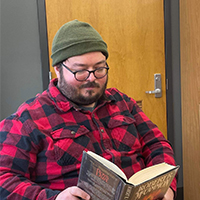
James Moore is a poet and writer born and raised outside of Chesterfield, Virginia. He studied Literature and Creative Writing at Regent University, and currently lives with his wife, two dogs, three cats and a turtle in Chase City, Virginia. He loves to read classic horror novels and watch reruns of “Psych”.
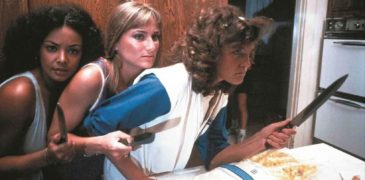
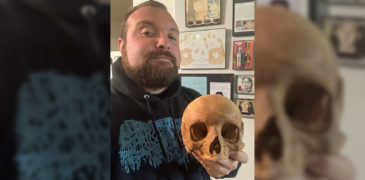
![Interview with Alex DiVincenzo and James Cilano of Witter Entertainment [Video Content]](https://www.grimoireofhorror.com/wp-content/uploads/2021/05/Interview-Witter-Entertainment-365x180.jpg)
